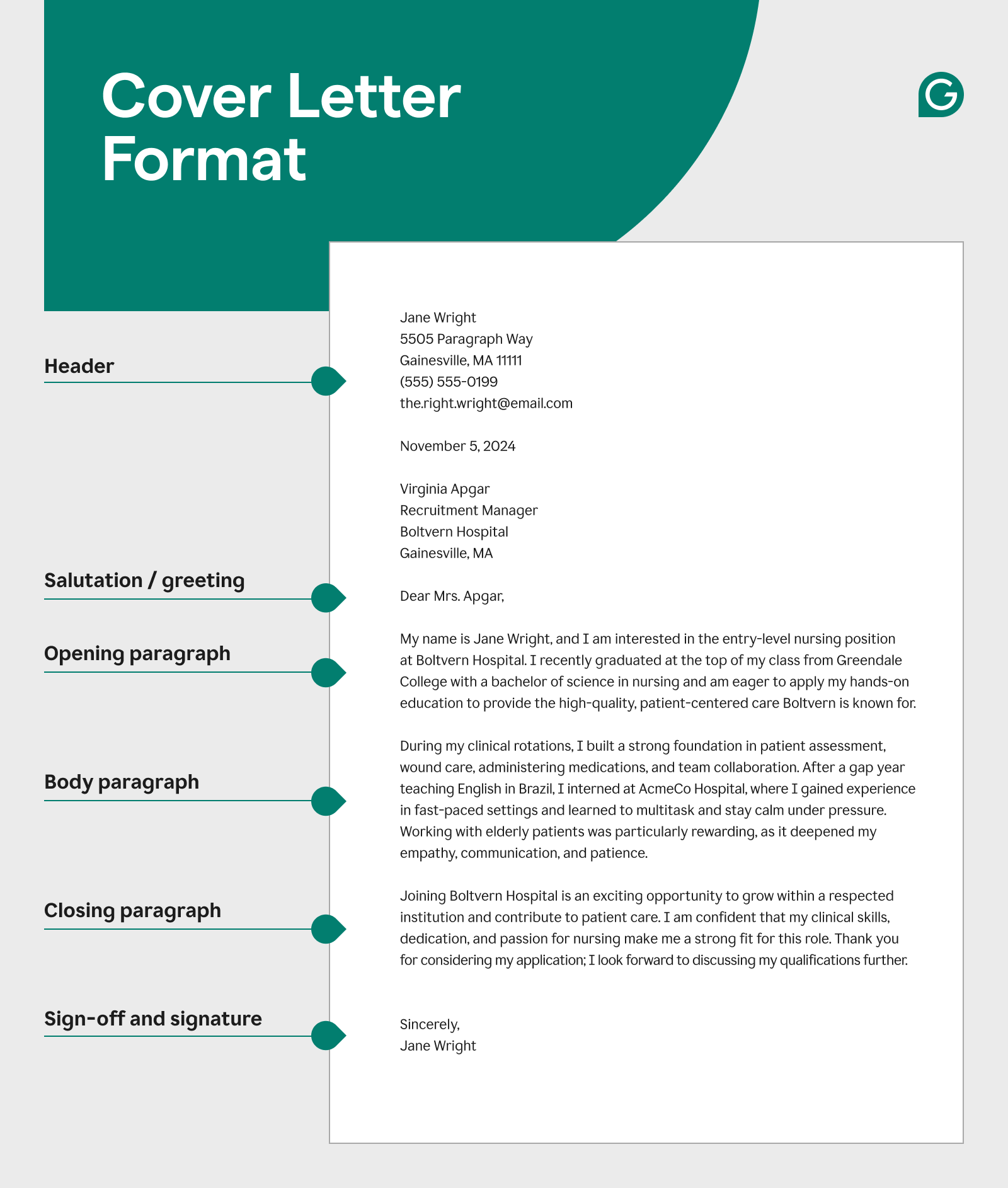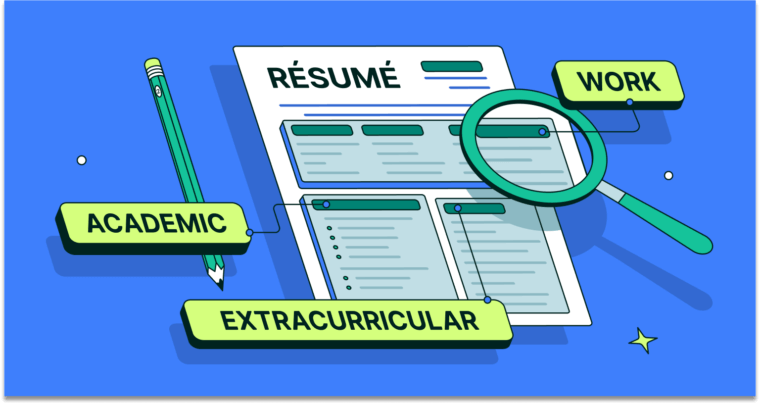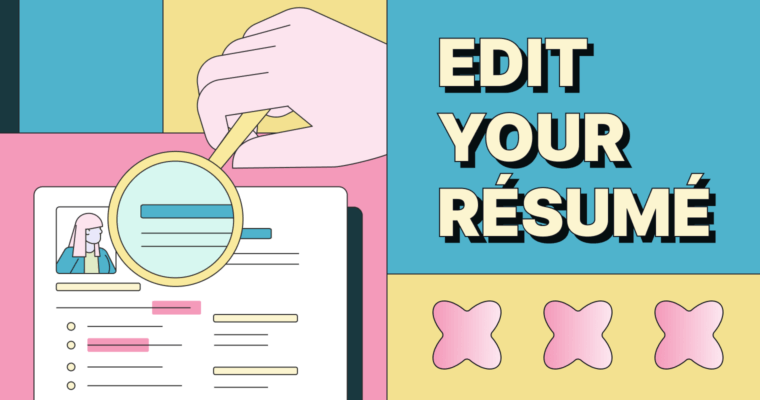
What is a cover letter and why is it essential in today’s job market? A well-written cover letter can be the key to landing your dream job, giving you the opportunity to introduce yourself, highlight your qualifications, and make a memorable first impression. But knowing what to talk about and how to phrase it isn’t always obvious. In this guide, we’ll explain everything you need to know about cover letters: what they are, the different types, and what employers look for.
Table of contents
- What is a cover letter?
- Ideal cover letter length
- Types of cover letters
- Tips for writing strong cover letters
- Cover letters FAQ
What is a cover letter?
A cover letter is a brief document accompanying your résumé or CV that provides additional context about your interest in the role and the company, and highlights relevant qualifications and experiences. Unlike résumés, cover letters allow you to explain gaps in employment, highlight specific achievements, and showcase your personality.
Cover letters also allow hiring managers to get a sense of your communication style. Details such as typos, word choice, and tone can influence an employer’s decision. Hiring managers also use cover letters to determine whether a new hire would likely be a good cultural fit.
Because it can be challenging to write about yourself, using AI can be a helpful way to get started. Our free AI cover letter generator can help you come up with a first draft, which you can then personalize and refine to reflect your unique style.
Cover letter vs. résumé
You might wonder, “Why write a cover letter when my résumé already has everything they need to know?”
Unlike résumés, cover letters are personal, allowing you to show your communication style and personality. While résumés are essential for listing your qualifications, they can feel a bit impersonal. A cover letter offers a chance to connect on a human level, giving hiring managers a sense of who you are beyond the data.
Cover letters also let you add valuable context to your résumé. For instance, you can briefly explain employment gaps or short job tenures, which can help ease any concerns and show transparency. There’s no need to go into detail; a simple, honest explanation can make a big difference. Cover letters are also a great place to share relevant passions or personal connections to the role—things that don’t always fit in a résumé but could set you apart.
How long should a cover letter be?
A typical cover letter is around three or four paragraphs, ideally under 500 words. Like a résumé, it should convey essential information, not a detailed story. Cover letters should be concise and succinct, highlighting the key points while leaving out unnecessary details.
Types of cover letters
Application cover letter
The most common type, an application cover letter, is a brief letter or email that accompanies your résumé. This type of cover letter is typically used in response to a specific job posting or advertisement. When people talk about “cover letters,” they’re usually talking about this type.
Application cover letters are best suited to job postings and advertised roles. They are sometimes listed as a requirement in a job posting, but sometimes employers just assume you’ll include one. However, if you’re sending a letter to a company that was not a response to a job post, you’ll need a different type of cover letter.
Letter of interest
A letter of interest, also known as a cold-call letter or prospecting cover letter, is a cover letter that was not solicited. You’re writing out of the blue and not in response to a job posting. Unlike application cover letters, which follow more standardized guidelines, letters of interest should be highly customized to the recipient and the organization.
In a letter of interest, include a brief overview of your job history, as you would in a standard cover letter, but also focus on why you’re specifically drawn to this company and the types of roles you’re seeking. Approach the letter with respect and professionalism, as you’re introducing yourself without a formal invitation.
Letters of interest are often passion projects, written for companies you want to work for even if they’re not explicitly hiring. While letters of interest have a somewhat low success rate for job placement, you’d be surprised how much a little initiative and enthusiasm impresses some employers.
Networking cover letter
A networking cover letter is like a blend of an application cover letter and a letter of interest. Networking cover letters are addressed to someone specific within a company or industry, usually a contact shared by a colleague (hence the name, networking cover letter). They’re not necessarily solicited like an application cover letter, but they’re not out of the blue like a letter of interest.
When writing a networking cover letter, aim to make a strong impression. While a mutual connection can provide an initial advantage, you’ll still need to highlight your relevant skills and explain why you’d be a valuable addition to the team. Networking cover letters provide a unique opportunity to leverage personal connections while showcasing your professional strengths.
Key elements to a successful cover letter
What should a good cover letter include? A successful cover letter has several key elements: clear contact information, a professional greeting, a strong opening, a compelling body, and a confident closing. Additionally, successful cover letters make a connection with the hiring manager. Below, we’ll walk you through each section to help you create a polished, impactful cover letter. For more details, check out our full guide on how to write a cover letter.
Contact information
If you’re writing a print cover letter, include your contact information at the top left corner. Start with your name, address, phone number, email, and the date, followed by the recipient’s name and contact details. For an email cover letter, you can skip the header, but be sure to include your phone number and email address below your signature.
Greeting
Cover letter openers should be professional and respectful. Address the recipient by their full name and title, such as “Dear Ms. Williams.” Avoid casual greetings like “Hey” or using only their first name. Ending the greeting with a comma is typical.
Opening paragraph
The opening paragraph of a cover letter introduces you to the reader and should include a compelling “hook” that sets you apart. This is also an ideal place to say why you’re interested in a particular position or company before you get into your job history. If you have a certain passion for this type of work, mention that too—enthusiasm and genuine interest make a strong first impression.
Body paragraph
In the body paragraph, outline your work history and relevant experience in a way that brings your résumé to life. Share a few background details, such as why you chose certain roles, what you enjoyed, and key skills you developed. This is also a good place to address any résumé gaps or short tenures by offering brief, positive explanations. Feel free to include additional skills or achievements that are relevant to the job but may not fit in your résumé.
Closing paragraph
Like all good conclusions, ending a cover letter should summarize your key points and leave a lasting impression. This is a good opportunity to remind the hiring manager of the most important aspects that set you apart as a candidate.
Cover letters usually include some kind of call-to-action to incite hiring managers to choose you. For example, you can say something confident like, “I look forward to the opportunity to discuss my application further.”
Personal connection with the hiring manager
Don’t underestimate the appeal of personality in job applications. Employers are often looking for people who fit in with the current team or company culture, even if there are more technically suitable candidates.
Let your personality shine through in your cover letter. You should still maintain a proper degree of formality and professionalism, but it’s OK to mention details about yourself that help people understand what you’re about. In fact, these seemingly minor details are sometimes what influences employers to ultimately hire you.
How to write a cover letter: example
Dear AcmeCo,
As a skilled sales representative in the tech and electronics industry, I am excited to apply for the Sales Associate role listed on LinkedIn. AcmeCo’s commitment to groundbreaking AI innovation has always impressed me, and I am eager to bring my expertise in strategic sales and customer-centric service to a company I’ve followed and admired for years. With a proven track record of exceeding targets and building strong client relationships, I am confident I can contribute to your team’s continued success.
In my previous role at Boltvern, I built a loyal customer base and increased client retention by 25% by prioritizing tailored solutions and consistent follow-up. I was their youngest employee to be promoted to Senior Sales Representative in just under two years. Not only do I understand the client-side aspect of sales, but also I have a Bachelor’s in Computer Science from Cornell, which allowed me to understand the intricacies of the product and communicate its benefits effectively. While it’s unfortunate that my time in Weyland was cut short due to company-wide layoffs, I am eager to bring my skills to AcmeCo’s sales team.
My background in sales, combined with my passion for technology and commitment to client success, makes me an ideal candidate for this role. I look forward to the opportunity to discuss how my skills align with AcmeCo’s goals, and I am available for an interview at your convenience. Thank you for considering my application.
Best, Jonathan Conner
How to write a cover letter: template
Here’s a cover letter template you can use to write your own cover letter. Simply plug in your information to the corresponding part. For more details, check out our guide on cover letter formatting.
[Your name] [Address] [Phone number] [Email]
[Today’s date]
[Recipient’s name] [Recipient’s professional title] [Company name] [Address]
[Salutation/greeting],
[Introduce yourself. Explain your profession, the position title you’re applying for, and how you heard about it. Briefly mention why this role and company interest you and why you’d be a good match. Show enthusiasm. End with a sentence that transitions or leads into the next paragraph.]
[Summarize your job history, focusing on relevant experience. Add extra context, such as what you learned from these jobs or why certain experiences prepared you for this role. Feel free to address problems with your résumé, like gaps or short tenures. Mention related skills and achievements and any quantifiable results or metrics.]
[Reiterate the main benefits of hiring you, including any soft skills or attributes that align with the company culture. Restate your enthusiasm, thank them for considering your application, and add a call-to-action to suggest a follow-up, such as scheduling an interview.]
[Simple sign-off], [Signature]
Cover letter FAQ
What is a cover letter?
A cover letter is a brief document sent with your résumé or CV to provide additional information about your background, motivations, and interest in the role. Cover letters allow you to share context that doesn’t fit in a résumé, such as your reasons for applying or unique qualifications. Hiring managers also use cover letters to assess communication skills and get a sense of your personality.
What’s the best way to address employment gaps in a cover letter?
You don’t need to focus too much on employment gaps, but cover letters offer a good place to briefly address them. A simple, honest explanation can prevent assumptions and reassure employers. For example, mentioning a career break for family or education can provide helpful context without going into detail.
What do employers look for in a cover letter?
Cover letters give you an opportunity to showcase your personality and communication style in a way that résumés can’t. Employers use cover letters to determine someone’s personality and whether they’re a good fit for that team and company culture—so don’t be afraid to let your unique qualities and enthusiasm shine through.






